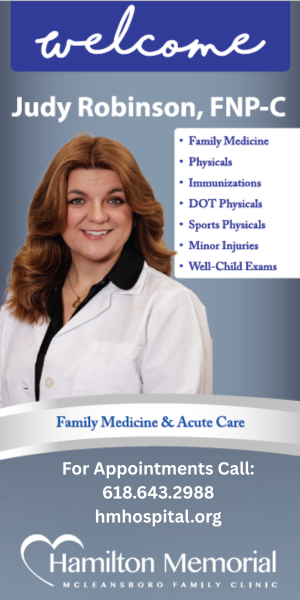(McLeansboro, Illinois) – Every 3-4 minutes, someone dies from a stroke. Thankfully, Hamilton Memorial Hospital in McLeansboro now offers state-of-the-art telemedicine technology that puts a patient in touch with immediate time-saving, life-saving stroke evaluation and treatment. Early access to advanced neurology specialists can make the difference at the most critical time – when lives are saved and brain function can be preserved.
“The telemedicine service means if you arrive in the emergency room with symptoms of a stroke, you have technology that gives immediate live access to doctors at the SIH Brain and Spine Institute in Carbondale – the largest neuroscience team in the region – 24 hours a day, seven days a week,” said Patty Blazier, Chief Nursing Officer at Hamilton Memorial Hospital.
Using computer-based, robotic cameras and tools, specialists like Alejandro Hornik, MD, a fellowship trained neurointensivist, are able to see and speak with attending physicians and medical staff while interacting with the patient and family in real-time.
“Telemedicine provides us with a tremendous tool to provide emergent stroke diagnosis and care in your community hospital; the speed and efficacy of our collaboration has an immediate impact on life-saving care,” Dr. Hornik said. Time is of the essence during the diagnosis and treatment of stroke; the initial hours are critical for patients to receive a clot buster to thwart life-threatening and debilitating outcomes.
The telemedicine program is the result of a Delta Health Care Services Grant from USDA Rural Development which was awarded to Southern Illinois Healthcare to work with additional hospitals and health care organizations to create the Southern Illinois Telemedicine Initiative. It allowed SIH to purchase equipment to connect rural hospitals to improve the accessibility and quality of patient care. The equipment is then owned by each participating hospital. The initiative enables participating organizations to deliver education, diagnosis or medicine between remote locations via telecommunications in “real time.”
“The Delta Health Care Service Grant incorporates the ability for teleneurology and telepsychiatry in the delta health care region of Southern Illinois. The patients are be able access, via telemedicine, care by a specialty physician,” Catherine Hungate Telemedicine Coordinator for SIH, stated.
“This type of technology is becoming vitally important to rural medicine especially for patients that are experiencing very serious medical conditions, such as stroke. To be able to be assessed and a plan of action put in place by a fellowship trained neurointensivist within minutes of presenting at our ER will undoubtedly save lives,” said Greg Sims, CEO Hamilton Memorial Hospital.
The Southern Illinois Telemedicine network includes eight area hospitals as well as Southern Illinois University School of Medicine, Illinois Hospital Association and Connect SI.
Why is immediate access to care important for stroke patients?
There is a short window of time when evaluation and treatment of a stroke is critical – this is when lives can be saved and brain function preserved. That’s why it’s important to know the symptoms and call 9-1-1 if you or someone you know is experiencing any of the warning signs.
What are the symptoms of a stroke?
Stroke symptoms include:
- Sudden numbness or weakness in the face, arm or leg, especially on one side of the body
- Sudden confusion, trouble speaking or understanding
- Sudden difficulty seeing in one or both eyes, dizziness, loss of balance or coordination
- Sudden severe headache with no known cause
Act F.A.S.T.!
Follow this F.A.S.T. acronym if someone you know is exhibiting any of the above symptoms:
- FACE – Ask the person to smile. Does one side of the face droop?
- ARMS – Ask the person to raise both arms. Does one arm drift downward?
- SPEECH – Ask the person to repeat a simple phrase. Is his/her speech slurred or strange?
- TIME – If you observe any of these signs, call 9-1-1 immediately!












